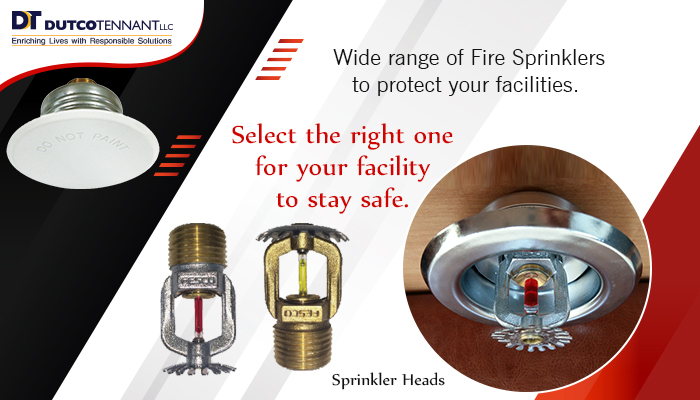
HOW DOES A FIRE SPRINKLER WORK?
The main point of concern for commercial building owners is to protect it from fire. A fire mishap not just endangers the tenants, customers, or employers but also puts the entire merchandise,property, equipment, and livelihood at risk. Firefighting sprinklers are the first mode of defense against fire as they offer a necessary level of safety for the entire property and the people. In the presence of high temperatures, fire sprinkler systems get activated by releasing water in a place where the temperature has increased rapidly. Although by the time a fire sprinkler gets activated, a fire may have already started but they prevent the fire from spreading and offer enough time for people to evacuate the building. So for these reasons, in certain buildings, sprinklers are mandatory.
Which regulatory body mandates the sprinkler system?
National Fire Protection Association (NFPA) is the primary organization that sets the standards for fire safety including fire sprinkler system requirements. There are several other regulations too which mandates the use of sprinklers. But the major set of rules about fire sprinkler systems are made by local municipalities and jurisdictions. So you must check with your local fire codes for understanding the fire sprinkler system requirements.
Working Principle
There is a myth that firefighting sprinkler heads are triggered by smoke. Sprinkler heads with glass bulbs containing a glycerin-based liquid are strategically placed. With the temperature at the sprinkler head rising between 135 to 165 degrees Fahrenheit, the liquid inside the glass bulb gets expanded and ultimately breaks the glass which ultimately activates the sprinkler head. Depending on the sprinkler type, the method of sprinkler activation can vary. Once the glass bulb is broken, the sprinkler head releases water. But however, the way the water is stored and is delivered via pipes depends on the fire sprinkler system type. Water is stored in the pipes by wet pipe systems and it is immediately released when the trigger breaks. Dry pipe systems also store water behind a valve which needs to be released before the water can flow through the pipes and out of the sprinkler head. Just like that of a dry pipe system, a pre-action sprinkler is the same except that the valve is controlled by an electronic device. The only exception is that the sprinkler system is not activated by heat at all. Instead of that, a fire alarm releases the water and a valve must be manually closed for stopping the water flow. All the pre-action sprinklers are used in pressurized air. Pressure in the pipes ensures the water is delivered quickly, in wet pipe sprinklers. Firefighting sprinklers detect the rising temperature at each individual sprinkler head and goes off only when the fire reaches the sprinkler. If you desire a sprinkler system where all the sprinkler heads go off at the same time, then you will need a deluge sprinkler system. They release water from every sprinkler head once a fire alarm goes off and are used in facilities with combustible liquids or flammable liquids where the threat of fire is extremely high.
Dutco Tennant LLC supplies the best in class sprinkler heads manufactured by the highest rated manufacturers of the world Parateck, who manufacture their products with the aid of the most advanced machinery. Our supplied sprinkler heads are guaranteed to provide utmost safety along with reliable performance for any kind of accidental fire breakouts. Dutco Tennant LLC has been able to earn an honorable position in the market of the Middle East and GCC region as a trusted supplier of various kinds of industrial and engineering solutions. We are also appreciated as a company that always meets the diverse demands of the customers and never compromises with quality and punctuality. For the last four decades, we have been working with various public and private sectors and have been working behind the infrastructural development of various nations. Our ongoing and completed projects include airports, exhibition centers, shopping malls, networking infrastructure, hospitals, hotels, universities, schools, industrial plants, etc.
